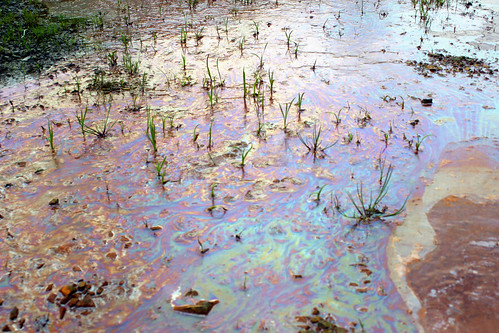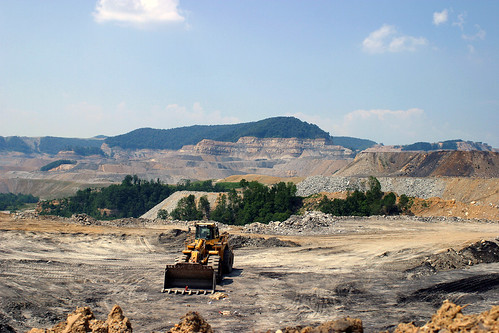Front Porch Blog
Update: SB 1025passed the Senate this afternoon. The Wise Energy for Virginia Coalition has something to say about that.
—
The Coal Lobby Fights Back by Making it Illegal to Test for Water Pollution Unless…They’ve Already Found Water Pollution
Before we talk about SB 1025 in Virginia, and the coal lobby’s radical attempt to completely grease the skids for the dumping of toxic waste into Virginia’s waterways, let’s begin with a all-too-common coal lobby sentiment on protecting water from Fenway Pollack, lawyer for the West Virginia Department of Environmental Protection (WVDEP), when asked what would happen if the state actually enforced water quality standards.
Taken to its logical conclusion, [enforcing water quality violations] would mean no one gets renewals. We’d just shut down mining.
It’s a little disturbing isn’t it? The Clean Water Act is perhaps the most popular piece of federal legislation ever passed. Because of the Clean Water Act, millions of Americans are able to actually use the “waters of the United States” for activities from recreation to quenching thirst. The Clean Water Act was signed into law on the simple principle that every human being deserves the right to clean drinking water. In the most prosperous country on earth, it makes sense that we should not have a problem providing American citizens with a sip of clean drinking water. Beyond the intangible benefits to public health ad well-being, the Clean Water Act is estimated to bring in more than $11 billion in economic benefits every year. We all drink water, and we all think it is better when it is clean. Right?!
 Unfortunately, there is one exception. Since its passage, the Clean Water Act has been attacked by polluting industries who would prefer to dump their poison directly into our taps and have us pick up the tab for the toxic waste that they’d rather not deal with. Suits them just fine, but the Clean Water Act has ensured that those industries have had to clean up their own mess and play by the same rules as everybody else. Meanwhile those same industries have relentlessly attacked citizen protections in the courts, in federal and state legislative houses, and through the regulatory process. However, recent events have made it clear. Absolutely nobody hates the Clean Water Act like the coal lobby does, and they have made perfectly clear that they have no intention of preserving the right to clean water that every American deserves. The coal lobby has waged a longstanding, nationwide “War on Water,” threatening much more than just the coal-bearing communities of Central Appalachia. Just over 40 years ago, The Cuyahoga River in Ohio was repeatedly catching on fire, all over the country people were piping their raw sewage into waterways upstream of communities and industrial waste was being wantonly dumped into American lakes and rivers. By passing the Federal Water Pollution Control Act in 1972, and the Clean Water Act in 1977, Congress set to address problems like these, and preserve our ability to use our precious water resources.
Unfortunately, there is one exception. Since its passage, the Clean Water Act has been attacked by polluting industries who would prefer to dump their poison directly into our taps and have us pick up the tab for the toxic waste that they’d rather not deal with. Suits them just fine, but the Clean Water Act has ensured that those industries have had to clean up their own mess and play by the same rules as everybody else. Meanwhile those same industries have relentlessly attacked citizen protections in the courts, in federal and state legislative houses, and through the regulatory process. However, recent events have made it clear. Absolutely nobody hates the Clean Water Act like the coal lobby does, and they have made perfectly clear that they have no intention of preserving the right to clean water that every American deserves. The coal lobby has waged a longstanding, nationwide “War on Water,” threatening much more than just the coal-bearing communities of Central Appalachia. Just over 40 years ago, The Cuyahoga River in Ohio was repeatedly catching on fire, all over the country people were piping their raw sewage into waterways upstream of communities and industrial waste was being wantonly dumped into American lakes and rivers. By passing the Federal Water Pollution Control Act in 1972, and the Clean Water Act in 1977, Congress set to address problems like these, and preserve our ability to use our precious water resources.
 In 2002 the coal lobby got themselves a special carveout when – without Congressional approval – the Bush Administration rewrote the regulatory definition of “fill material” to include the toxic waste that comes from mountaintop removal sites. The “valleyfills” associated with mountaintop removal sites have buried and polluted more than 2000 miles of headwater streams with arsenic, lead, mercury, chromium, selenium, cadmium and a whole host of toxic heavy metals and chemicals. The states that have been most impacted are Kentucky (730 miles of streams lost as of 2002), West Virginia (307 miles), Virginia (151 miles), and Tennessee (20 miles). State regulatory agencies are often openly antagonistic to the thought of having the coal industry properly dispose of its waste, and some federal elected officials are no help. The dumping of this toxic waste needs to stop, which is why Appalachian Voices and many others are pushing for the passage of federal legislation such as the Clean Water Protection Act (House) and Appalachia Restoration Act (Senate).
In 2002 the coal lobby got themselves a special carveout when – without Congressional approval – the Bush Administration rewrote the regulatory definition of “fill material” to include the toxic waste that comes from mountaintop removal sites. The “valleyfills” associated with mountaintop removal sites have buried and polluted more than 2000 miles of headwater streams with arsenic, lead, mercury, chromium, selenium, cadmium and a whole host of toxic heavy metals and chemicals. The states that have been most impacted are Kentucky (730 miles of streams lost as of 2002), West Virginia (307 miles), Virginia (151 miles), and Tennessee (20 miles). State regulatory agencies are often openly antagonistic to the thought of having the coal industry properly dispose of its waste, and some federal elected officials are no help. The dumping of this toxic waste needs to stop, which is why Appalachian Voices and many others are pushing for the passage of federal legislation such as the Clean Water Protection Act (House) and Appalachia Restoration Act (Senate).
 But rather than working with citizens to protect our waterways, the coal lobby escalated its war on water yesterday in Virginia. A new piece of legislation cleared committee in the Virginia General Assembly that is a direct attack on the protections of the Clean Water Act. Senate Bill 1025 – otherwise known as the What-You-Don’t-Look-For-Can’t-Hurt-You Law – does not stop the dumping of coal mining waste into streams. It doesn’t help identify how to protect our wells and water supplies from these toxic chemicals. Instead, this piece of legislation would compel state officials to ignore information that the coal industry doesn’t want you to know about what they put into our water. In a twisted Catch 22, SB 1025 would prevent state officials from testing water unless it is somehow already known to be hazardous to life. To put it another way, the state’s hands are now tied in determining if water from a stream below a toxic mining dump is unsafe, because they would not be allowed to test waterways that are not already considered toxic. This would be like the TSA requiring that bomb sniffing dogs at airports to only sniff bags that the TSA already knows have explosives in them. The bill makes it impossible for the state to even attempt to determine if a coal company is egregiously violating the Clean Water Act and endangering the ecology and people of communities downstream. If it passes, this bill sets a powerful and dangerous precedent for all Americans who want to know exactly what their industrially polluting neighbors are dumping into their river.
But rather than working with citizens to protect our waterways, the coal lobby escalated its war on water yesterday in Virginia. A new piece of legislation cleared committee in the Virginia General Assembly that is a direct attack on the protections of the Clean Water Act. Senate Bill 1025 – otherwise known as the What-You-Don’t-Look-For-Can’t-Hurt-You Law – does not stop the dumping of coal mining waste into streams. It doesn’t help identify how to protect our wells and water supplies from these toxic chemicals. Instead, this piece of legislation would compel state officials to ignore information that the coal industry doesn’t want you to know about what they put into our water. In a twisted Catch 22, SB 1025 would prevent state officials from testing water unless it is somehow already known to be hazardous to life. To put it another way, the state’s hands are now tied in determining if water from a stream below a toxic mining dump is unsafe, because they would not be allowed to test waterways that are not already considered toxic. This would be like the TSA requiring that bomb sniffing dogs at airports to only sniff bags that the TSA already knows have explosives in them. The bill makes it impossible for the state to even attempt to determine if a coal company is egregiously violating the Clean Water Act and endangering the ecology and people of communities downstream. If it passes, this bill sets a powerful and dangerous precedent for all Americans who want to know exactly what their industrially polluting neighbors are dumping into their river.
My colleague Tom Cormons, the Virginia Director for Appalachian Voices says:
Stream monitoring and effluent toxicity testing are indispensable tools for enforcing the law when it comes to water pollution, and that is precisely why big coal is trying to curtail their use. What’s astounding is that the General Assembly has passed this coal industry bill tying our own state regulators’ hands by restricting their ability to use standard water testing.
Why doesn’t the coal industry want you to know what they are putting in your water? Well, it’s because their dumping of toxic waste into streams has been shown to have a well-documented, well-known, and peer-reviewed negative impact on human health and life expectancy. Even the pro-MTR Secretary of the WVDEP, Randy Huffman, has been caught off guard admitting that the impacts are real.
Our opposition [to EPA’s permit reviews] has been more about the process than it has been about the science. There is a lot of validity to the concerns about the downstream impacts. I think that’s the change in direction everyone is going to have to make to meet the downstream water quality requirements. I don’t see any choice but to reduce the impacts. – Randy Huffman, WVDEP Secretary, 1-06-2010, speaking with the Charleston Gazette on West Virginia’s new state policy on valleyfills
This new state law in Virginia is a STEAL for the coal lobby. By taking away the ability to test waterways for toxic heavy metals and chemicals, they are preempting the documentation of their inevitable violations of the Clean Water Act. Meanwhile, they are continually burying thousands of miles of streams under toxic mining waste. Everybody wins except everybody!
How much are we as people worth to the coal lobby, or to Virginia’s elected officials for that matter? Here’s a good indication. Recently, EPA made a heroic and well publicized veto of the Spruce #1 mountaintop removal mine, which would have been the largest mountaintop removal site in West Virginia history. The original Spruce Mine permit would have buried more than 8 miles of headwater streams – an immense and unnecessary impact. During negotiations with Arch Coal, EPA brought forth an alternate permitting plan which would have reduced the impacts on water quality and human health by half, but Arch coal walked away because it would have cost them a grand total of 55 cents more per ton of coal. With Central Appalachian coal currently selling at $77.70/ton, this would represent an increase of 0.7% in order to protect human heath and water quality for this generation and the next.
Our headwater streams and our public health are certainly worth 55 cents to me, and I would wager to say most Virginians. I want that security for myself and for my family. The coal lobby has made it clear that they would prefer that our families not be protected from their toxic waste. Is this radical act by the Virginia General Assembly the beginning of the end of the Clean Water Act? Anyone who enjoys a tall cool glass of water had better hope that the Virginia State Senate gets ahold of itself before the final vote, expected later today.
PREVIOUS
NEXT
Related News

Leave a comment
Your email address will not be published. Required fields are marked *


I have friends now who say, “Legal doesn’t always equal right”. No matter what is right, most politicians will go along with industries who value money more than life–life in the mountains, life in the streams, life in the humans who die prematurely, and the lives of those who live downstream.
It is indeed a sad day or days to come! However, I do not believe that we can just lay aside the Clean Water Act, even if those who enforce it are not elected, as Senator Puckett pointed out.
The vote just went through 38-2. A tragic day in Virginia. Serious national implications. More to come…
This is the most preposterous approach to the problem I’ve ever seen. If this becomes law then the people of Virginia who didn’t stand up and be heard will get just what they deserve. Is anybody in Virgina even aware of this? Do they care? Get the word out.
Thanks for the great information! Now, can we get some information on the status of this bill? Is it in committee? Has it been voted on/read/enrolled? Who is the sponsor? I appreciate any information you have that we can act upon. Thanks!
We’re very happy to have your readership and thoughtful commentary David. I would imagine that the many good folks who work on water law in Virginia (including App Voices legal team and SELC) are considering different ways that this bill might be approached in court. Thats an interesting point regarding section 505, and I know that we’ve already seen strong pushes in both KY and WV for the federal EPA to take over for the states, who are failing so miserably at protecting their citizens in coal-bearing areas.
We didn’t touch on it as much in this post, but one thing that is particularly scary is that the coal lobby is working the federal government just as hard as they are the state governments, and we could see some major rollbacks of the Clean Water Act, the Clean Air Act, and a lot of other citizen protections if we are not vigilant.
JW, your Front Porch blog, which I’ve only recently and fortuitously happened upon, is extremely well-written and informative, thank you. Concerning Virginia’s SB 1025, where does one begin? You used the perfect word to characterize this proposed legislation: Egregious. Big Coal apparently owns not only West Virginia and Kentucky, but Virginia as well.
From a judicial perspective, should the law pass, it would be interesting to see how a citizens’ suit, brought by Virginia residents under section 505 of the Clean Water Act, claiming that the Virginia Department of Environmental Quality, either will not, or cannot, under 1025, adequately enforce the Clean Water Act, and asking the feds to take over CWA enforcement, would fare. Further, the suit, or a companion one, might argue that this law violates constitutional separation of powers requirements, in that a legislative body has taken on an executive enforcement role, and should be struck down.
The bottom line, politically, however, is that through this proposed legislation, Big Coal has put the world on notice that, in spite of growing public awareness of and opposition to mountaintop removal coal mining, the industry intends to continue its colonialization and rape of Appalachia, unabated.